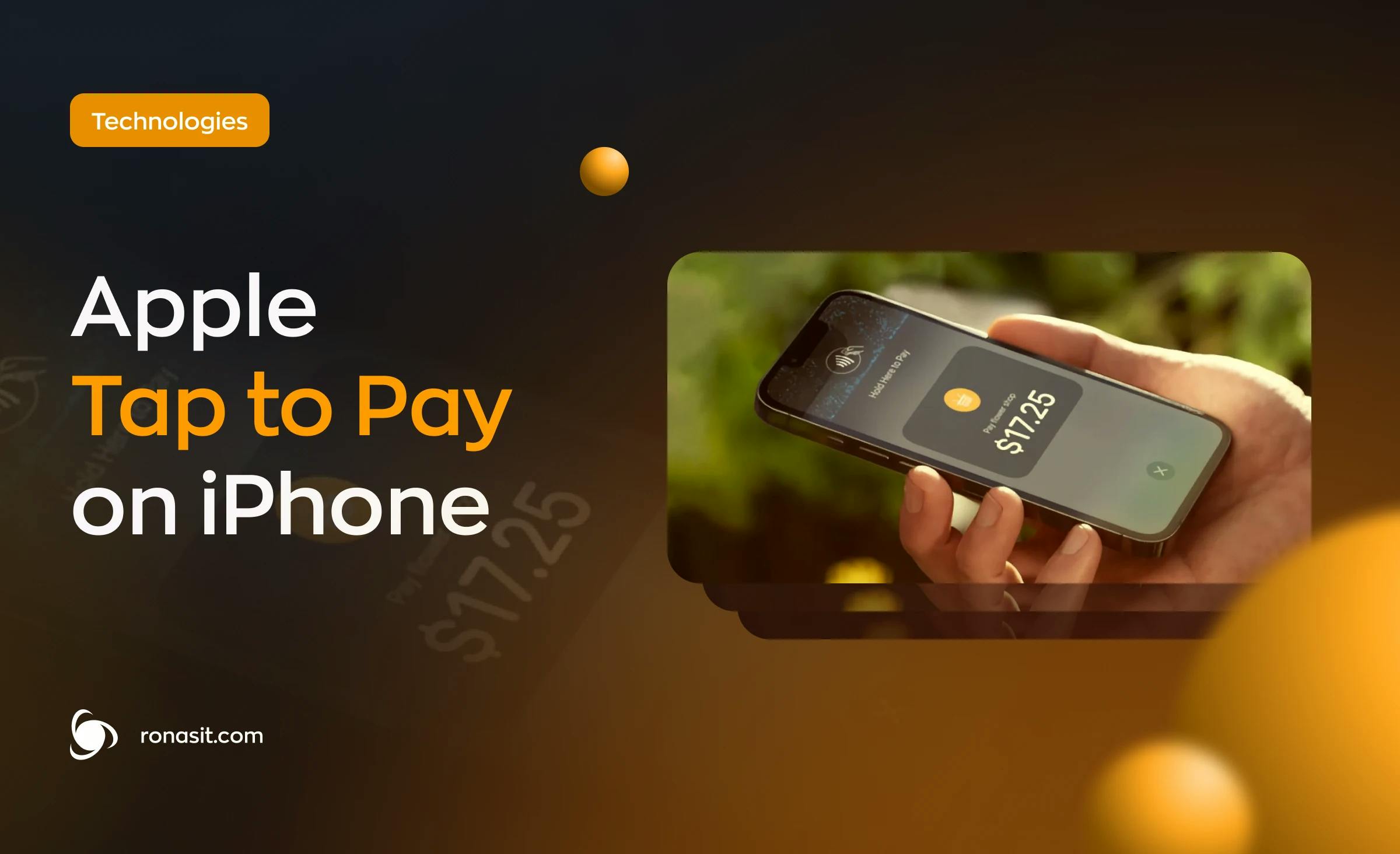Apple Tap to Pay on iPhone: contactless payments
Apple has recently announced the release of Apple Tap to Pay. Users will soon be able to use their iPhones as payment terminals. The new feature will allow business owners to receive payments contactless without the need to use terminals, credit card readers for iPhones, or any other types of hardware. The payments can be received from any contactless payment-enabled plastic cards and devices.
The Mastercard study showed that 46% of consumers all over the world use contactless cards as their top-of-wallet payment option, and this proportion only rises. The new feature presented by Apple corresponds to the global trend, and it might revolutionize the world of business. All the entrepreneurs will be able to give quick and safe checkouts to their customers, no matter how big or small their enterprise is. Tap to Pay can become a good choice for startups and small business owners because the new feature will allow them to improve the quality of their service and spend fewer resources on hardware. What technology stands behind Tap to Pay, and what is so special about it? Let’s explore the topic in detail!
What is NFC payment?
Tap to Pay is based on NFC technology, where NFC stands for near-field communication. This technology allows exchanging the data between NFC-enabled devices within the range of 10 centimeters. NFC chips make wireless communication possible. Several advantages make chips effective for connection. They are small, and the connection between a pair of chips can be established within a second. Also, they don’t consume too much of the device’s charge energy. These features make the chips easy to install and effective in various life spheres.
NFC devices consist of the reader and the antenna or the tag and the antenna. The reader is an active part of the mechanism. It generates a magnetic field and sends commands to the tag — the passive element of the system. The greatest advantage of using NFC chips is that you don’t need an internet connection to exchange data between them. Besides, you don’t need to establish connection between chips manually or locate active devices as we usually do with Bluetooth.
Due to the high usability, NFC chips can be used in various spheres and industries. And NFC and payment is not the only possible option. NFC chips can be used for creating passes for industrial enterprises, hotels, or entry phones. Moreover, this technology allows you to keep a virtual version of your public transport pass inside your smartphone and use it to pay for travel on a bus or subway. NFC-enabled bracelets are already widely used in healthcare. With their help, hospital staff can track the location of the patients or check the information about the prescribed treatment or the schedule of the medical checkups. The chips and tags can even be used for managing smart house devices. They can be coded to trigger actions like switching the light or Wi-Fi network or opening garage doors.
Learn more about startup development and new aspiring technologies in Stories and articles.
What is Tap to Pay?
Apple has recently brought a novelty to the world of NFCs. They released an Apple Tap to Pay that can turn iOS devices into terminals. Now any business starting from small hot dog trucks to beauty stores can receive money transfers using iPhones. A few years ago, Apple acquired a Canadian startup Mobeewave that was developing a similar innovation. Finally, the update was announced on the 8th of February.
Soon the only thing you need to purchase goods or services will be to tap an iOS device to another device or a contactless credit card. The new technology will support Mastercard, Visa, American Express, and Discover contactless cards. Only the iOS devices starting from XS and later support the update, which means that the owners of the older NFC-enabled models like iPhone 6, 7, and 8 won’t be able to use the new feature.
The developers didn’t forget to protect the confidential data of the customers. All the transactions made with Tap to Pay are secured with Secure Element like in Apple Pay. It means that no one can find out what you are purchasing or to whom you are making transfers to.
Stripe was the first company that started offering Tap to Pay services to its business partners, including Spotify Point of Sale. The Apple press release also says that more payment platforms will be able to use Tap to Pay by the end of this year. By providing the enterprises with the new technology, Apple becomes a rival of Square — the company that provides hardware and terminals for accepting money transfers.
How to use Tap to Pay?
Tap to Pay is a method of receiving payment but not a method of payment itself. Merchants will be able to receive loyalty cards, issue refunds, and validate credit cards using the new feature. To start using Tap to Pay, they need to download an iOS app that supports the feature from the App store, accept its terms on the device and wait some time for the device to be configured. When the procedure is completed, the merchants can start receiving contactless payments with their iPhones.
When customers go through checkout, they can be asked to hold their smartphone, Apple Watch, touchless plastic card, or a digital wallet near the merchant’s iPhone. Then the transaction is securely completed with NFC. When we use Tap to Pay, the payment process becomes transparent and seamless. The sum of money that the merchant requests, the name of the merchant, a spend category icon, and a spot to tap the NFC-enabled device — all these are displayed on the screen. All in all, no fraud can be left unseen.
The interface designers and IT specialists will soon be able to add the new feature to the apps they develop. The Apple team already created a set of guidelines intended to make the process of using Tap to Pay smoother. These guidelines include the following recommendations:
Customers should know the final amount they are going to pay before transferring money.
Various organizations may have systems of discounts or tipping. The sellers should count the total amount their customers are going to pay before asking them to transfer money. To provide that, the total amount of money should be clearly written on the smartphone screen. And app developers are responsible for creating the interface that corresponds to this rule.
Business owners shouldn’t confuse Tap to Pay with Apple Pay.
Tap to Pay is a method of receiving payment, while Apple Pay is a method of payment. So, designers of the interface should distinguish them by creating two different buttons for these features. These buttons shouldn’t be placed near each other, so the end users won’t confuse two different flows.
Developers and designers should provide the content that helps the entrepreneurs learn how to use Tap to Pay.
The app developers should explain to the business owners how to accept payments from plastic cards, smart watches, or digital wallets. The developers and entrepreneurs should make test transfers together. Also, developers should teach the entrepreneurs to switch between Tap to Pay and hardware like credit card readers. All this will help the business owners understand the benefits of the feature and present it to their clients.
Learn more about the Apple guidelines.
Ronas IT designers are really impressed with this new feature. It will make the process of checkout quicker and more convenient. It will also give a boost to startups and small-sized businesses. From now on the business owners won’t need to spend extra resources on hardware like terminals or credit card readers. That’s why we decided to present our vision of the iOS app with Tap to Pay feature. And here is our design concept for the Point of Sale app.
When creating this concept, we tried to follow all the recommendations mentioned in the Apple guidelines.. We added the item category icon, the name of the organization, and the spot to tap the customer’s NFC-enabled device. Also, we used a san serif font to make the numbers of the price easier to read.
Ronas IT is a company that creates digital solutions for small businesses and startups. We are a full-stack IT company, so we can design and develop digital products as well as maintain them after the project work is over. Our work approach is based on business analytics and agile-based development. We have already been on the market for 15 years and helped our clients launch more than 400 successful projects in the fields of fintech, team management, business automation, and delivery. Learn more about Ronas IT services.
Let’s sum up!
- Apple Tap to Pay is a technology released by Apple. It allows merchants to turn their iPhones into payment terminals and receive money transfers from their customers without any extra hardware like a terminal or a credit card reader.
- Contactless payments and Tap to Pay are based on NFC, the technology that allows exchanging data between devices within the range of 10 centimeters. NFC is widely used for touchless payments, and it can be implemented in many other fields of our everyday life and business.
- Almost 60% of consumers say they are more likely to use the merchant’s goods and services if they are offering touchless payments, as this kind of payment provides them with safety and convenience. So, Tap to Pay will most likely revolutionize the world of business, give a boost to startups and small-sized businesses, and make them stand out from the rivals that don’t give quick and safe contactless checkouts.

